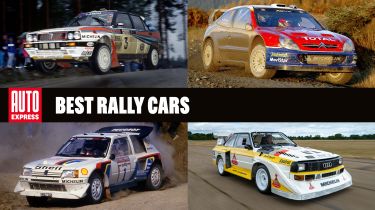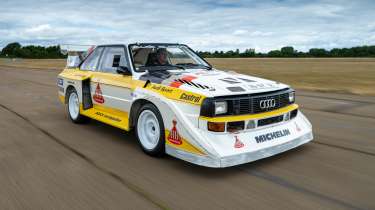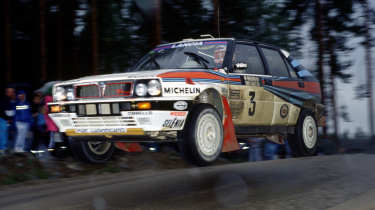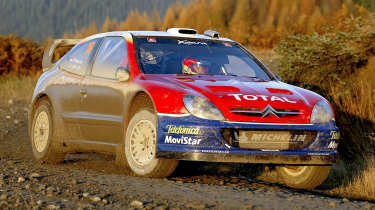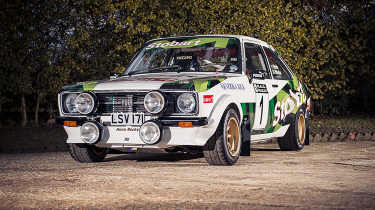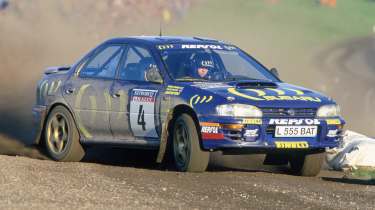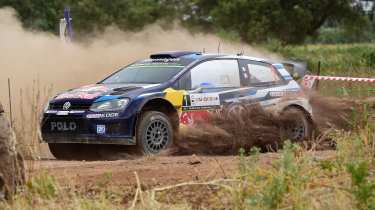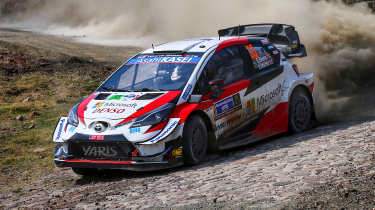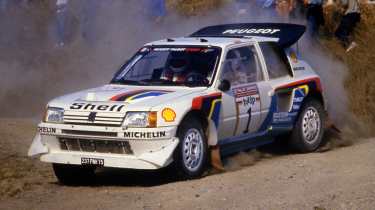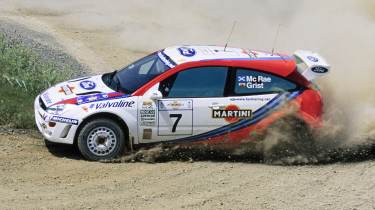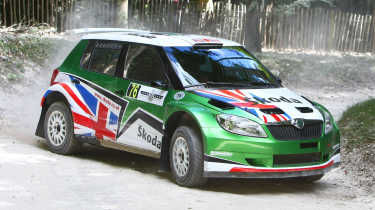Best rally cars: the 10 greatest-ever legends of the world rally scene
The best rally cars destroyed the competition on rally stages but also spawned some great road-going relatives that we had the pleasure of driving
For many motorsport fans, rallying represents the high octane pinnacle of four-wheeled competition. Competing on everything from snowy mountain passes, to rutted forest tracks and tortuously twisting Tarmac roads, it pits drivers against some of the toughest conditions in the world.
Yet the real star of the show are the rally cars, which slither and slide spectacularly through each special stage. Boasting wild aerodynamic additions, flame-spitting turbocharged engines and sophisticated transmissions, these highly specialised machines never fail to get heart rates racing as they blast past spectators that have often waited hours for the spectacle.
A big part of the appeal of rally cars is the wide variety on offer. Unlike many circuit racers, such as single seater F1 machines, rugged rally competitors have always been based on road-going models that you and I could buy. That means anything from a sleek coupe to a sensible family saloon can be turned into a fast forest warrior.
So which are the best rally cars of all time? Well, we’ve drawn up a list of 10 of our favourites, all of which have proved their status by winning multiple events and championships over the years. We’ve covered all years of the sport since the inception of the World Championship in 1973, which means everything from the fearsome Group B rally cars of the Eighties to the current generation of high-tech WRC machines. So, slip on your wellies, pop on your bobble hat and get ready to revel in the greatest rally cars ever to spray gravel across a special stage.
1. Audi Quattro
Few cars have had such a big impact on motorsport as the Audi Quattro. With its novel four-wheel drive transmission and powerful, snarling five-cylinder turbocharged engine, the big German coupe revolutionised rallying when it made its debut in 1981. With almost unheard of levels of traction, the Audi was head-and-shoulders above the two-wheel drive competition, especially in slippery conditions.
Reliability troubles initially held the Quattro back, but in the hands of star drivers Hannua Mikkola, Stiq Blomqvist, Michele Mouton and Walter Rohrl the Audi quickly became unstoppable. Initially homologated under the Group 4 rules, the Quattro also competed under Group B regulations, which required a production run of just 200 cars regulations and led to the wild, flame-spitting S1 with over 500bhp. By 1984 the competition had caught up with their own four-wheel drive cars, but that didn’t stop Audi winning 23 rallies and two manufacturers’ and two drivers’ titles before it pulled out of full time competition at the end of 1986.
2. Lancia Delta
From the late Eighties through the early Nineties one car dominated rallying - the Lancia Delta. The shatteringly fast supercharged and turbocharged Group B S4 set the tone when it made its debut in 1985, but it was the production-based Group A (requiring a minimum of 5,000 examples to be built) machine that launched in 1987 which really underlined the Italian team’s dominance.
Based on the brand’s humble five-door family hatch, this remarkable rally car won an incredible 46 rallies between its debut and the factory squad’s withdrawal from the WRC at the end of 1992. It also clinched a record-breaking six consecutive manufacturers’ titles as well as two driver’s crowns each for Italian ace Miki Biasion and Finnish star Juha Kankunnen.
Over that time, the turbocharged 2.0-litre all-wheel drive Lancia Delta developed from the rather basic HF 4WD into the wide-arched Integrale and, finally, the muscle-bound Evolution. More importantly, it resulted in a run of homologation special road cars that are still considered some of the most thrilling driver’s machine’s ever created.
3. Citroen Xsara WRC
This is the car that helped create the legend of Sebastien Loeb, the French ace that clinched a record-breaking nine world championships. The road-going Citroen Xsara was a worthy but dull family hatch, but the highly specialised WRC machine proved to be one of the fastest and most sophisticated rally cars ever.
Making its debut in 2001, the Citroen won the Tour de Corse with Jesus Puras, while Loeb triumphed in Germany in 2002. However, it wasn’t until 2003 that the French squad mounted a full assault on the WRC title, recruiting world champs Colin McRae and Carlos Sainz to drive. Both were promptly upstaged by their young French team mate who won three times on the way to Citroen clinching the manufacturer’s prize.
In 2004 Loeb won six rallies and his first world title in the Xsara, while in 2005 he set a new record by winning 10 events in a season. Yet the Xsara’s legend was sealed in 2006, when Loeb won his third title despite lacking full factory support (the car was run by Belgian privateer team Kronos) and missing the final four rounds of the championship after falling off his mountain bike while training.
4. Ford Escort Mk2
When you ask someone of a certain age to think of a rally car, it’s probably a Ford Escort Mk2 that springs to mind. The brilliant Blue Oval machine dominated rallying the Seventies and early Eighties, its boxy lines, screaming Cosworth engine and sideways cornering style making it a special stage icon.
Entered into the WRC in 1975 under the top Group 4 regulations that required 400 road cars to be built, the Escort RS1800 was an instant hit, winning that season’s gruelling RAC Rally in the UK in the hands of Timo Makinen.
The following year, Roger Clark triumphed in the same event, becoming the first Brit to win a round of the WRC. But it was the Scandinavian stars such as Bjorn Waldegard, Hannua Mikkola and Ari Vatanen that netted the bulk of the Ford’s 17 world rally wins. The former clinched the first ever driver’s title in an Escort in 1979, while the latter did the same in 1981, beating revolutionary Audi Quattro. Mechanically simple, great to drive and with an exceptional sporting pedigree, the Escort remains hugely popular today as a fast and successful frontrunner in numerous historic rallying championships.
5. Subaru Impreza
Could this be the most famous rally car of all time? With its distinctive blue paintwork, glitzy gold wheels and trademark exhaust bark from its turbocharged flat-four engine, the Subaru Impreza was one of the motorsport pin-ups of the Nineties and Noughties. Better still, homologation rules meant you could buy a fast and fun road-going version. But of course it was the Japanese car’s most famous driver that really cemented its legend: Colin McRae.
The flamboyant Scot became the first British world champion in 1995 with the original Group A 555 machine, before debuting the iconic wide-arched Impreza WRC in 1997. In total, McRae won 15 rallies in various versions of the car between 1994 and 1998 before switching to Ford in 1999. Yet his replacement, Richard Burns, proved just as quick, winning eight rounds and the 2001 title. By this time Subaru had switched to the bigger second generation Impreza, which Norwegian star Petter Solberg used to storm to the 2003 world title. Sadly, the car’s competitiveness waned over the following years and Subaru pulled out of the WRC at the end of 2008 having not won a rally since 2005. Yet none of that tarnishes the Impreza’s status as one of the rally car greats.
6. VW Polo R WRC
When it comes to WRC dominance the VW Polo R literally takes some beating. With 43 wins over 53 rallies and four seasons, the German machine had a strike rate that no rival has come close to matching.
This performance is even more remarkable when you consider the brand was a virtual special stage novice when it pitched-up at the season-opening Monte Carlo rally in 2013. It had experienced some minor success with its MK2 Volkswagen Golf GTi in the late eighties, but there was nothing to suggest the squad would sweep the floor with tough opposition that included Citroen and Ford. Yet with ambitious French ace Sebastien Ogier (ably assisted by team mates Jari-Matti Latvala and Andreas Mikklesen) on driving duties and a crack team of engineers and designers, VW quickly got the taste for victory.
VW withdrew from the WRC at the end of 2016 following the company’s embarrassing involvement in the dieselgate scandal, but in its short time in the sport it had won four back-to-back driver’s and manufacturer’s crowns.
7. Toyota Yaris WRC
A new set of technical regulations for 2017 encouraged teams to build some of the fastest, most powerful and visually aggressive rally cars ever - and it was ra ecipe Toyota couldn’t resist. Absent from the WRC since the end of 1999, when it left to concentrate on its ill-fated F1 campaign, the former world championship-winning squad’s return nearly two decades later was big news. Led by four-time champ Tommi Makkinen, the Finnish-based team’s Toyota Yaris WRC took its debut win in snowy Sweden, its second event, with Jari-Matti Latvala at the wheel. Yet it wasn’t until Estonian ace Ott Tanak joined in 2018 that the turbocharged 1.6-litre machine really got into its stride, winning 10 rallies and the 2019 driver’s championship.
Sebastien Ogier added further two world crowns to his tally (taking him to eight) when he joined the team in 2020. By the time the Yaris’ hybrid-powered successor arrived in 2022, it had triumphed in 26 events, clinched two manufacturer’s titles and a trio of driver championships.
8. Peugeot 205 T16
Audi turned rallying on its head with the Quattro in 1981, but it was arch-rival Peugeot that really made the most of four-wheel drive and the Group B rulebook. With just 200 production cars required, the French firm was able to create a highly specialised race car for the rally stages.
Bearing a passing resemblance to its newly launched 205 supermini, the Peugeot 205 T16 used lightweight composite bodywork covering a bespoke mid-engined chassis and featured a powerful turbocharged 1.8-litre engine, and all-wheel drive transmission.
Flamboyant Finnish world champ Ari Vatanen gave the car its debut on the 1984 Tour de Corse, opening out a two minute lead before crashing. However, he then won five consecutive events, including the 1985 Monte Carlo where he overcame a five minute deficit to Walter Rohrl’s Audi to win by the same amount, completely humbling the Quattro. The Evolution 2 version of the Peugeot featured over 500bhp and wild wings front and rear, helping Timo Salonen and Juha Kankunnen to world titles in 1985 and 1986 respectively. And when Group B was banned at the end of 1986, specially modified versions of the 205 T16 won the gruelling Paris Dakar rally in 1987 and 1988.
9. Ford Focus WRC
By the time the Ford Focus WRC first hit the stages in 1999, the WRC had become blockbuster viewing. No fewer than seven manufacturers had signed-up to compete, including Subaru Mitsubishi, Toyota, Peugeot, SEAT and Skoda. More importantly, the Blue Oval’s new driver signing, Colin McRae, was one of the most famous motorsport personalities in the world thanks to his spectacular driving and his big-selling Playstation game.
Developed by Malcom Wilson’s M-Sport squad (who continue to run Ford’s WRC cars), the Focus looked the part and was fast, if a little fragile - although it still took two wins. For 2000 two-time champ Carlos Sainz joined McRae and the wins kept coming, Scottish star McRae only losing the chance at a second world title when he spectacularly crashed out of the 2001 Wales Rally GB season finale. In 2005 the car was upgraded to MK2 Focus specification, and with Marcos Gronholm as lead driver Ford won back-to-back manufacturer’s titles in 2006 and 2007. The Focus was finally replaced by the smaller Fiesta WRC in 2011, by which time it had racked up 44 wins.
10. Skoda Fabia S2000/WRC2
Few brands have been as committed to rallying as Skoda, which has been a familiar sight on the special stages since the 1930s. Yet while the Czech brand has dabbled at the sport’s very top level, its Octavia and Fabia WRC machines were fairly underwhelming performers. However, in rallying’s second rung WRC2 category the team has been a dominant force.
Starting with the naturally aspirated Fabia S2000 in 2009 and continuing through to the turbocharged R5, Rally2, Rally2 evo and current RS Rally2, Skoda has notched-up 76 WRC2 class rally wins and 13 world titles. The Fabia was also a prolific winner in the now defunct Intercontinental Rally Challenge (IRC) and has scooped six European Rally Championship crowns.
Just as importantly, the Fabia has played a big part in establishing the careers of numerous top drivers, including Esapekka Lappi, Teemu Sunineen, Andrea Mikklesen, Oliver Solberg and current two-time world champ Kalle Rovanpera.
Tell us which new car you’re interested in and get the very best offers from our network of over 5,500 UK dealers to compare. Let’s go…
